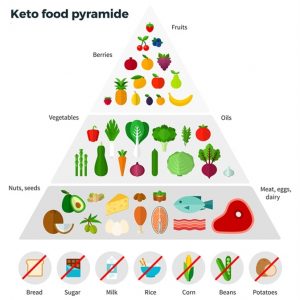The keto diet has recently come into its own in the world of nutrition, with some of its many proponents boasting its effectiveness in helping people lose weight and keep it off. But there’s a hidden danger lurking beneath the surface when it comes to the keto diet: ketoacidosis. As more and more people turn to the keto diet for its promised benefits, the risks of developing ketoacidosis is also on the rise. In this article, we’ll explore what ketoacidosis is, the dangers it presents, and what you can do to prevent and treat it.
Table of Contents
- 1. The Low-Down on Ketones: What They Are and What They Do
- 2. How Ketones Can Become Harmful: the Risk of Ketoacidosis
- 3. Prevention of Ketoacidosis: Knowing the Symptoms and Treatments
- 4. What the Research is Saying About Ketone Risks
- 5. Taking the Right Steps: Keeping Watch Over Ketone Levels
- Q&A

1. The Low-Down on Ketones: What They Are and What They Do
Ketones are an important part of normal metabolism that is present in everyone’s body. But what exactly are they, and what do they do? Here’s the low-down on ketones:
Ketones are molecules that the body makes when it has to use fat instead of glucose for energy. When you eat fewer carbohydrates or suddenly switch to a very low-carbohydrate diet, the liver will convert fats into molecules called ketone bodies or ketones for short. The minutes the body is in ketosis, it will use fat instead of glucose, resulting in weight loss and better health.
Ketones have some amazing benefits, including:
- They can help the body to burn fat rather than carbohydrates for energy.
- They can help reduce hunger, cravings, and food intake.
- They can reduce inflammation in the body.
- They can increase mental clarity and focus.
- They can increase energy levels during exercise.
Ketones can also provide additional health benefits when used in tandem with a healthy diet and exercise. But, it’s important to talk to your doctor before starting any new health regimen.
2. How Ketones Can Become Harmful: the Risk of Ketoacidosis
One of the biggest risks when consuming a keto diet is ketoacidosis, a potentially serious medical condition. When ketoacidosis occurs, the body produces too many ketones, leading to dangerously high levels of blood acidity and ketones, which can cause damage to organs. In a healthy individual, the kidneys and lungs typically filter out ketones before they reach life-threatening levels. However, if the body is unable to process the ketones quickly enough, they can become dangerous.
Ketoacidosis can affect those with diabetes, particularly those with type 1 diabetes, as well as pregnant women and people with conditions such as kidney disease, alcoholism or liver failure. If you have any of these conditions, it’s important to speak to a doctor before trying a keto diet. In addition, watch out for signs and symptoms of ketoacidosis, which may include:
- Fatigue
- Rapid breathing
- Fruity-smelling breath
- Nausea and vomiting
- Confusion and disorientation
If you experience any of these, seek medical advice immediately. In general, ketoacidosis is rare but it’s important to be aware of it so that you can take steps to prevent it.
3. Prevention of Ketoacidosis: Knowing the Symptoms and Treatments
Ketoacidosis is a potentially dangerous condition which can lead to many unwelcome health complications for diabetics. It is important to be aware of the signs and treatments to stay safe.
- Signs and Symptoms
- Frequent dehydration.
- Elevated blood sugar levels.
- Lethargy and confusion.
- Nausea and vomiting.
- Excessive thirst or hunger.
- Fruity-smelling breath.
- Treatment and Prevention
- Check for ketones in urine.
- Keep track of blood sugar levels.
- Stay hydrated.
- Exercise regularly.
- Monitor for any new or unusual symptoms.
- Note changes in food intake or insulin doses.
- Contact your doctor if ketoacidosis is suspected.
Ketoacidosis is a preventable complication, but it’s important to stay alert for signs and symptoms. Being aware and familiar with the warning signs can help keep you safe from its dangers. Regular monitoring and accurate tracking of food intake, medication doses, and blood sugar can help to prevent episodes of ketoacidosis. When in doubt, contact a healthcare professional right away.
4. What the Research is Saying About Ketone Risks
Ketone risks and their research can be difficult to navigate due to the many studies out there, but there are clear findings that suggest the potential long term risks involved with ketone use. Here’s a quick look at some of the research.
- There is a potential risk for developing type 2 diabetes, as some research indicates that individuals with elevated ketones may need to be more careful in terms of their dietary carbohydrate intake.
- Ketone use can lead to ketoacidosis, a severe medical condition that requires medical attention.
- There is potential for an electrolyte imbalance as a result of using ketones.
- Ketones may also increase the chances of developing kidney stones.
While these serious risks should not dissuade individuals from using ketones, they should be taken into consideration when making decisions regarding ketone use. It is important to consult with a healthcare professional before embarking on any type of ketone use regimen.
5. Taking the Right Steps: Keeping Watch Over Ketone Levels
It is important to monitor ketone levels with diabetes. Ketone levels can vary depending on the type of diabetes and the level of activity someone is doing. Too much or too little of ketone in the body can result in serious blood sugar imbalances.
Here are five steps on how to keep watch over ketone levels:
- Check Blood Levels: Regular blood tests are needed to track the levels of ketones in the bloodstream. These tests can provide a warning to know if there is an issue with ketone levels.
- Proper Diet: A healthy diet low in carbohydrates, sugars, and fats is necessary for maintaining ketone balance. High-fiber foods like vegetables, fruits, and whole grains are especially beneficial for polishing blood levels.
- Exercise: Exercising is important for everyone with diabetes since it can help maintain blood sugar. It also helps keep ketones in the bloodstream from increasing beyond a healthy amount.
- Monitor Meal Plan: Keeping track of the food consumed is important for keeping the balance of ketones. It helps to know when the body needs more fuel or less fuel.
- Medication: For more serious cases of diabetes with major ketone imbalances, medication may be the only way to even out the levels. However, these should only be taken under the guidance of a doctor.
Keeping watch over ketone levels can help protect the health of those with diabetes. By following a balanced diet, exercising regularly, monitoring meals, and taking medication when necessary, it is possible to maintain a healthy balance of ketones.
Ketones are now a hotly debated topic, and it’s important to stay informed. As research continues to emerge, the potential dangers of ketoacidosis may become better understood. One thing is for sure: If you decide to try a ketogenic diet, you should be aware of the risks and make sure to take safety precautions. Knowledge is power, and understanding ketones can lead to a healthier future.











